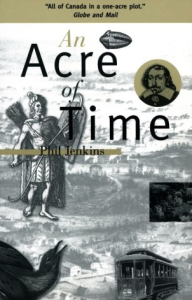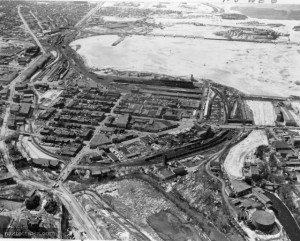It was my pleasure to meet you for coffee and finally put my hands on An Acre of Time, a history of LeBreton Flats. I wasn’t kidding when I said I discovered you in the most random of ways, a mention buried in the comments section of a review of a book of historical maps of New York:
Truth is, I know more about the history of New York City than I do about Ottawa, my home for the past 17 years. The busyness of daily life chisels away the exoticism and mystery of a place until it seems hardly worthy of further notice. But Ottawa is a city no less worthy nor interesting than any other if one is willing to dive deeply into the layers of story.
Understanding history, beyond the party trick of reciting dates and names, is complicated. It requires a tipping point of fundamental knowledge, which is quickly crowded by a multiplicity of interpretations and points-of-view. It demands a persistent curiosity to move beyond the scratched surfaces of people long dead, places drawn and quartered and events interpreted by subjective bystanders. Then there’s the question of where to begin.
You weave a story of an acre of land, lying below Parliament Hill and bounded by the Ottawa River, from when it lay drowned by an ancient sea – and whales swam overhead – to when it dried out, greened up, and peopled out, the first settling over millennia, the rest arriving in a frantic blink of an eye. The acre was chopped down, carved up, built-on and, finally, stripped bare of its community and left to die, a brownfield fifty years thus.
In the beginning you invite readers to “Leave where you are and come stand beside me” and in that line lies the strength of your story. It is engaging, intimate, contextual and readable narrative non-fiction whose scope and scale is kept in check by the birds-eye view from your first-person roost. Anyone who’s read Canadian history will recognize the thematics of conflict we’ve grown to know and love: English vs. French, colonials vs. First Nations, Canada vs. America, land vs. money, power vs. ideals, government vs. the people, locals vs. immigrants, and community vs. urban renewal. Herculean subjects all, but still you propel the story forward.
The first point you make abundantly clear is this: Make no mistake, it is always about the land.
The story [of the acre] comes to us from letters and recorded speeches of men now dead, so we can never ask the first person what the real story was. Besides, there is no such thing as the real story.
Between 1599 and 1633 [French explorer Samuel de] Champlain will cross the Atlantic twenty-nine times, averaging just over two months per crossing - five years of his life spent commuting. If professions have lineages, Champlain's leads down 400 years to the astronauts in the Apollo moon missions. On behalf of an imperial power....he went to the edge of a frontier and extended it...a 'terranaut'
But there was a vital difference between his job description and that of the modern astronauts. The frontier Champlain was contracted to explore was already inhabited.
[pullquote]The frontier Champlain was contracted to explore was already inhabited.[/pullquote]
As with any Eden, the acre will be for one last time lush, fecund, and unspoiled. Land that defies the word ‘undiscovered’, that has supported woodland peoples since the beginning in a “constant and massive presence for over twenty centuries” had been ‘found.’ With one fell swoop, everything changed.
...the acre is be a construction site of organic architecture, bustling with ingenuity and survival, reproduction and extinction. Skylines will grow, forest fires will level those, and new skylines will rise in their place...The settling of the acre by generations of flora will proceed unhindered until, to be precise, 1818, when the lordly trees will feel the first predator: a man with an axe.
Here comes a biped with an ability to adapt that is frightening. It combines a limitless curiosity with the skill of manufacture...a brain that grasps solutions and hands that can grasp anything...a prodigious memory, and it very much enjoys breeding. It is determined, sooner or later, to go everywhere and, once there, to stay.
Progress had arrived, and progress is a train with no reverse gear.
You tell us “the written history of Canada is a book that starts only five centuries ago.” Unfortunately whatever bones lie in whichever ground bear little weight compared to the stroke of the pen. What can be recorded in a ledger – and conversely legally bought and sold – is what matters. But King George III’s proclamation of 1763 – a written proclamation, a promise to protect native land – didn’t help much, did it? And when the land registry books were inscribed, the Algonquins were left out. Clearly, pen and paper do not serve everyone equally.
But, as you’ve said, it’s all about the land, land that was arguably never ceded, never traded away for a “…few goods… [that] are soon worn out and gone.”
They came and kept coming and this latter-day inundation overwhelmed: French, English, Loyalists, American entrepreneurs, European migrants and land speculators, looking to make their fortune first on fish and furs then on timber and free land. They aimed to leave their mark.
Place names...let history know who has passed this way...Landlords, as they arrive, mark their territory not by leaving scent on a tree, but by changing the title of the ground the tree stands on.
When they took over management of new land in their rash of colonization, the British exported the doctrine of enclosure. An unwitting recruit, the acre lost much of its spiritual wealth and respect in the process. Its essence no longer lay in its ability to provide food for a native family, but was inherent in its surface area and its proximity to a waterfall. It was primarily this latter virtue that first bestowed on the acre its market value.
[pullquote]When land is transformed into real-estate, the phases shifts from its natural gifts to its commercial potential; from greenery to greenbacks. [/pullquote]
Fast forward a hundred and fifty years. LeBreton Flats is very much alive, a mixed-use blue collar neighbourhood, yes, but no slum. Interesting and homely, but not aesthetically pleasing in a Rockcliffe kind of way, it is deemed unworthy to lie below Parliament Hill and so it must be expunged.
Cities have always been cannibalistic. They eat large chunks of their own pasts, chewing up landscapes and buildings and regurgitating them. This municipal mastication implies a kind of hunger, the hunger to replace then with now, to recycle stale visions of a city with fresh ones.
What happened to the acre in the 1960's was the result of a steamrolling civic vision. It is perhaps the premier example in the country of the haste to reach glory, to be world-class, overwhelming a parochial sense of community.
Canada got its own [Washington] District of Columbia. With the Peace Tower on Parliament Hill as the centre pole, the National Capital Region was staked out like a groundsheet, nine hundred square miles on either side of the river. The fiefdoms within it, the cities and villages, kept their mayors and their councils, but chains were rattled. A higher authority, the National Capital Commission, had been turned on, with the ultimate right to expropriate.
"Owning" land is a myth. Ownership of part of the earth's crust is really no more than leasing, with the option to sell to lease. Expropriation is always possible, by an act of government or an act of violence. In the acre's case, Chapter 106 of the Expropriation Act of 1952 gave sanction to the unhousing of the 2,800 people who lived and worked on the Flats.
...as of May 1964, "the Commission has been able to demolish seventy-five buildings, which may contain as many as twenty-five families, out of a total of 215, and the balance are being removed as quickly as possible." He went not to say: "As is characteristic of local residential districts, when about 40% of the properties are vacated, the occupants of the balance of the housing leave voluntarily. This seems to be caused by the break-up of the social community and the remaining homes, due to their proximity to vacated housing which is subject to vandalism and to other annoyances. As a result, most of the occupants of residential properties in the Le Breton Flats have now left."
After expropriation and demolition the acre began its “second childhood.” It reverted back to crown land, a tabula rasa, begging the questions: Who is its rightful owner? And what is its highest and best use?
Fast forward another fifty and we’re on the eve of approvals implementing a Phase 2 development vision for the site. For the record, Phil, I’m partial to your vision of an urban forest and park. I have spent my fair share of time in Stanley Park and Central Park and can’t imagine either city without its timeless green.
I look forward to our acre walkabout and luncheon as soon as the weather shifts from bitter cold to bearable. I hope you still have the giant measuring rod you used to mark out the acre, way back when, because there are pictures to be taken besides having much to discuss.
I look forward to seeing you again soon.
Kindest regards,
Andrea
*********
Further reading:
Fields of Vision by Phil Jenkins
Riversong by Phil Jenkins
Beneath My Feet by Phil Jenkins




5 responses to “LeBreton Flats: An Acre of Time”
[…] for writer and journalist Phil Jenkins saying that I wanted to meet him and purchase a copy of An Acre of Time about the history of LeBreton Flats. We met in a cafe in Chelsea, Quebec and after an hour of so of […]
Beautifully written-I really enjoyed this piece. Thank you
Thanks, Erin! Appreciate the feedback. Kindest, Andrea
Thanks for sharing this, we posted link on our timeline.
My pleasure! The history of the Flats is incredibly interesting. I can’t imagine what it was like for people to have everything they knew and loved wiped out in one fell swoop.